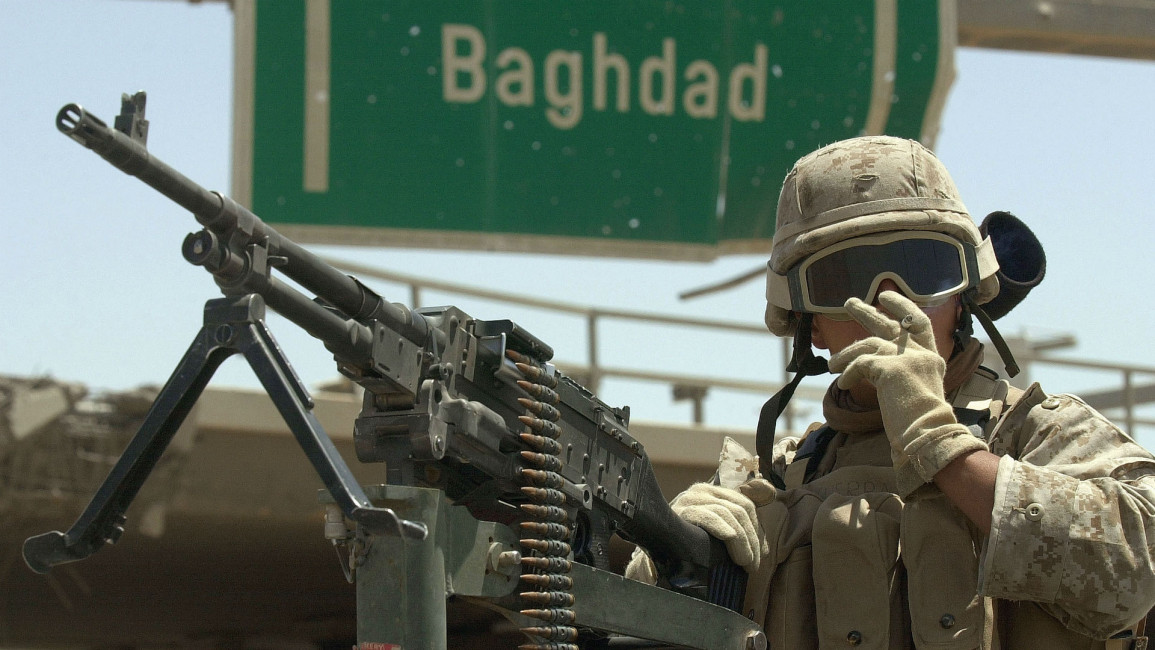
Learning from the failures of the Iraq war
Displacement, destruction and devastation scarred Iraq after decades of war and corruption. However, when my mother reflects on her childhood, she speaks of a once flourishing country, where different religious groups treated each other as equal and as one community, the Iraqi community. The leading medical school she attended, the University of Baghdad was free of charge, as was healthcare for the majority of the Iraqi citizens. Most know what happened next.
19 years ago, The US and the UK invaded Iraq, on the false premise Iraq held weapons of mass destruction. Iraq also has one of the largest oil reserves in the world, making it an attractive place for imperialist powers to occupy. Despite the state propaganda’s drive to convince the British people that war on Iraq was a necessary and appropriate action to take, large numbers of people saw through it.
A million people took to the streets of London, protesting the British government’s impending involvement in the war. Many were hopeful the mass defiance meant there was no way Britain would join the US in invading Iraq. We are supposedly in a “democracy” after all, right? But those hopes were dashed very quickly when the UK beat the drumbeats of war and prepared to destroy another country in their imperialist conquest.
''Despite the attempts by protestors to intervene and stop the war, no material difference was made for the Iraqi people. Many of them were tortured, lost family members, their livelihoods, and lived through one of the most traumatic experiences inflicted on humans. All whilst, the profiteers of war, the arms companies operating across Britain, were left untouched.''
The equivalent number of protestors on the march against the Iraq war was matched tragically by 1 million Iraqi citizens killed in our name.
Though the war in Iraq proceeded, many deemed the march a success, and claimed it as the springboard of an anti-racist movement in Britain. However, despite the attempts by protestors to intervene and stop the war, no material difference was made for the Iraqi people. Many of them were tortured, lost family members, their livelihoods, and lived through one of the most traumatic experiences inflicted on humans. All whilst, the profiteers of war, the arms companies operating across Britain, were left untouched.
Such companies include KBR, a US weapons company, which made a killing off the destruction in Iraq. All together, they were awarded contracts worth almost $40billion to arm the invasion. Rather than being held accountable for the war crimes they profited from, KBR continue to gain lucrative deals due to “their long term commitment to the British military operating alongside one another in Afghanistan, Iraq and other remote locations”, as said on their website.
Unsurprisingly, the same company who made a fortune off the murder of the Iraqi people, works in partnership with Elbit Systems, Israel’s largest arms company.
Elbit are notoriously known for marketing its weapons as “battle-proven” on the captive population of Gaza. Together, Elbit and KBR, established the joint venture called Affinity Flying Services. Doubling up on their dealings in the business of bloodshed, made them an apparent perfect fit for the British military, whose pilots are trained by the lethal partnership.
To defeat western imperialism, we must acknowledge that the march was not nearly enough to prevent the tragedy that was forced upon the Iraqi people. What if just 10% of the million protestors dismantled or blockaded the weapons before they were used to kill the people of Iraq?
When the political system is broken, there is no option left but to bypass it completely. For some, this stark realisation and feeling of powerlessness over the imperialist drive of successive British governments, turned their attention to direct action.
One such person is Richard Barnard, a co-founder of Palestine Action, and attendee of the Iraq march was left with a sense of guilt after hearing first hand experiences from victims of the invasion. In his words, “I have realised that guilt can be harnessed into power, the power of collective action against arms companies who power such conflicts and operate right here”.
The realisation of the failure of the political process to effect change, led Barnard and others, to take direct action against arms companies operating on our doorstep. The growth of Palestine Action, is testament to the failure of the political establishment to hold war criminals accountable.
Unfortunately, we can’t turn back the clock, but we can learn from the lessons of our past to tackle imperialism moving forward.
This Sunday, commemorates 74 years since of the occupation of Palestine began. At the same time, the people of Yemen remain below the barrage of bombs built on British soil. The arms companies manufacturing their demise have addresses listed next to our doorsteps. Meaning, we have a direct opportunity and obligation to use direct action to take them down, before they take more lives in our name.
There is no more time to recycle tried and tested tactics. This is a matter of life and death, and we must act as such.
Huda Ammori is a co-founder of the direct action network Palestine Action and has conducted extensive research and campaigns targeting British complicity with Israeli apartheid.
Follow her on Twitter: @HudaAmmori
Have questions or comments? Email us at: editorial-english@alaraby.co.uk.
Opinions expressed in this article remain those of the author and do not necessarily represent those of The New Arab, its editorial board or staff.


![President Pezeshkian has denounced Israel's attacks on Lebanon [Getty]](/sites/default/files/styles/image_684x385/public/2173482924.jpeg?h=a5f2f23a&itok=q3evVtko)



 Follow the Middle East's top stories in English at The New Arab on Google News
Follow the Middle East's top stories in English at The New Arab on Google News


